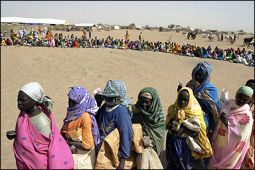A prayer for an end to world’s ‘worst’ crisis
By Jane Lampman, The Christian Science Monitor
July 14, 2005 — Committed to bringing an end to what the United Nations has called the world’s worst humanitarian crisis, many Americans are focusing this weekend on the power of prayer.

|
|
Sudanese displaced people wait to receive food supplies from the World Food Programme (AFP). |
From July 15 to 17, thousands of Christian, Jewish, and Muslim congregations will hold worship services, offer sermons and homilies, and engage in prayer for the people of Darfur, in western Sudan. Some 400,000 people in that region of Africa’s largest country have died amid conflict over the past two years, and more than 2.5 million remain displaced and in danger.
The National Weekend of Prayer and Reflection, sponsored by a coalition of more than 130 faith-based and humanitarian groups, comes one year after Congress called the atrocities carried out in Darfur genocide.
The UN has since turned the matter over to the International Criminal Court, but Sudan’s government insists it alone has jurisdiction to try any perpetrators. Some troops from the African Union are on the ground to protect refugees, but clashes and raids by militias continue.
A report by the International Crisis Group, a conflict-resolution organization headquartered in Brussels, last week called on NATO to deploy troops temporarily until more African forces can be marshaled.
“Every day, Darfur experiences horrendous crimes, including gang rapes of women and girls, the burning of homes and religious buildings,” says David Rubenstein of the Save Darfur Coalition, which is coordinating the weekend effort. “Working together, individuals and faith communities can help bring this to an end.”
The coalition (www.savedarfur.org) formed last year to raise awareness and mobilize the United States to take leadership on the issue. Religious groups have worked to educate communities on the crisis, write political leaders, raise relief funds, and back divestment campaigns against Sudan’s government, widely seen as supporting the militias.
In Petaluma, Calif., an interfaith campaign sparked by the United Church of Christ came to be called “Dear Sudan, Love Petaluma.” After sponsoring community educational events, the group was able to raise $10,000, enough to feed 65,000 Darfurians for one day, which it donated through Church World Service. Other US communities are copying their model.
In Chicago, St. Sabina’s Catholic Church has sponsored interfaith prayer rallies in a downtown plaza, sold bright green “Save Darfur” wristbands, and joined in a divestment campaign. That campaign succeeded; on June 23, Illinois Gov. Rod Blagojevich signed a law prohibiting state investment in companies doing business with Sudan.
The church also sponsored a talk by Paul Rusesabagina, the real-life hero of “Hotel Rwanda,” following his trip to Sudan with actor Don Cheadle. Their Hotel Darfur Campaign aims to prevent a worsening of the tragedy.
“As a nation, we haven’t given [this crisis] the priority it should have,” says Cory Williams, a parishioner at St. Sabina’s. “We should champion the cause.”
Faith-based humanitarian groups have long been active in southern Sudan, where the Arab Muslim north and the largely Christian and animist south fought a devastating, two-decade civil war. A peace agreement was finally reached, but conflict erupted in Darfur in 2003 when rebels there felt left out of the agreement; Khartoum supported militias attacking the rebels and local villages. Discovery of oil in Darfur raised the stakes.
Sudanese officials and two rebel groups have met a few times, and last week they agreed on a “declaration of principles,” upholding the unity of the country and calling for “an effective devolution of powers” to regional authorities. Details remain to be worked out, however, and observers are concerned that the Darfur conflict could drag on for years.
The international community seemed to be moving to resolve the issue last year, but some say the Asian tsunami diverted government and media attention. Two bills in Congress that would institute sanctions and a no-fly zone remain in committee.
